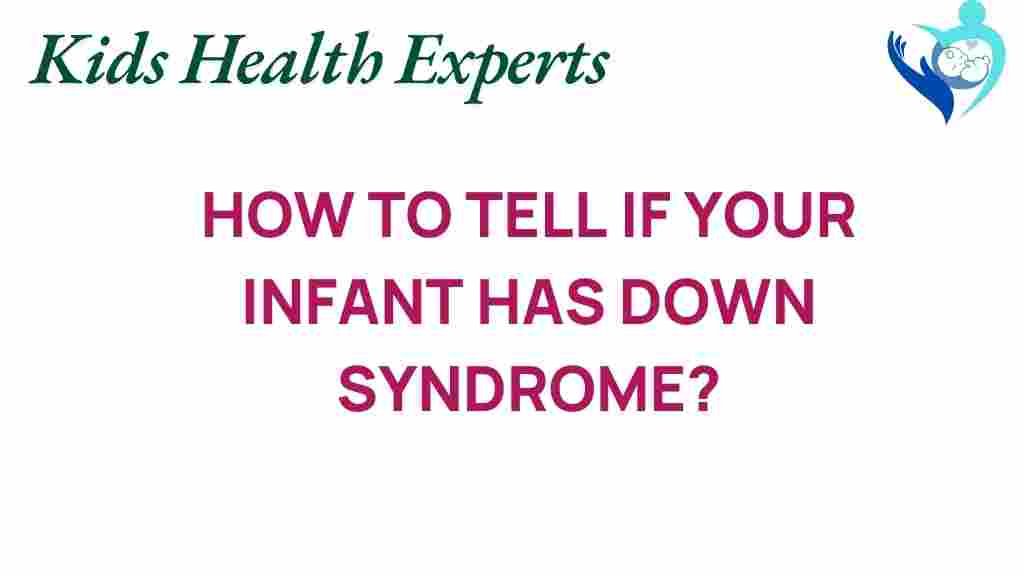Early Signs of Down Syndrome: What Every Parent Should Know
As a parent, ensuring your child’s health and well-being is a top priority. Understanding the early signs of Down syndrome is crucial for any parent. Down syndrome, also known as Trisomy 21, is a genetic condition that affects a child’s development, and early detection can lead to better support and resources. This article will explore the key signs of Down syndrome, the importance of early detection, and how parents can navigate this journey successfully.
Understanding Down Syndrome
Down syndrome is caused by an extra copy of chromosome 21, leading to developmental delays and physical differences. It is one of the most common genetic conditions, affecting approximately 1 in 700 births. Recognizing the signs early can help parents provide the necessary care and support for their child.
Importance of Early Detection
Early detection of Down syndrome is vital for several reasons:
- Access to Resources: Early diagnosis allows parents to access educational and health resources that can significantly improve their child’s development.
- Better Health Outcomes: Understanding a child’s health needs early can lead to better medical care and intervention.
- Parental Support: Early awareness helps parents connect with support groups and networks, making the parenting journey less isolating.
Identifying the Early Signs of Down Syndrome
While every child develops at their own pace, some early signs may indicate Down syndrome. It is essential to remember that not all children with these signs will have Down syndrome, but it is advisable to consult a healthcare professional if you notice several of these characteristics:
Physical Characteristics
Some common physical signs include:
- Flattened facial features, especially the bridge of the nose
- Almond-shaped eyes that slant upward
- A single deep crease across the palm of the hand
- Short neck and limbs
- A protruding tongue
- Small ears
Developmental Delays
Children with Down syndrome often experience delays in reaching developmental milestones. Here are some areas where you may notice delays:
- Motor Skills: Difficulty with crawling, walking, or other physical activities.
- Speech and Language: Delayed speech development or difficulty in communicating.
- Cognitive Development: Learning may take longer, and they may require additional support in school.
Behavioral Signs
Behaviors that may indicate developmental challenges include:
- Difficulty with social interactions or understanding social cues
- Repetitive behaviors or routines
- Challenges in adapting to change
Step-by-Step Process for Parents
If you suspect that your child may have Down syndrome, here’s a step-by-step guide on how to proceed:
Step 1: Consult Your Pediatrician
The first step is to talk to your child’s pediatrician. They can conduct an initial assessment and discuss your concerns. It is essential to be open and honest about what you have observed.
Step 2: Genetic Testing
If your doctor suspects Down syndrome, they may recommend genetic testing. This can be done through:
- Amniocentesis: A procedure that tests the amniotic fluid for chromosomal abnormalities.
- Chorionic Villus Sampling (CVS): A test that involves taking a sample of placental tissue.
Step 3: Early Intervention Programs
Regardless of the diagnosis, early intervention is crucial. Look for local programs that focus on child development. These programs may offer:
- Speech therapy
- Physical therapy
- Occupational therapy
Step 4: Connect with Support Groups
Many organizations provide support to families with children who have Down syndrome. Connecting with others can provide valuable resources and emotional support. Consider visiting National Down Syndrome Society for more information.
Parenting a Child with Down Syndrome
Parenting a child with Down syndrome comes with its unique challenges and rewards. Here are some tips to help you navigate this journey:
Education and Awareness
Stay informed about Down syndrome and its implications for your child’s development. Knowledge is empowering and can help you advocate for your child effectively.
Emphasize Strengths
Every child is unique. Focus on your child’s strengths and interests, and provide opportunities for them to shine. Celebrate their achievements, no matter how small.
Seek Professional Guidance
Work closely with healthcare providers and educators. Regular check-ups and assessments can help track your child’s progress and adjust interventions as needed.
Build a Support Network
Connect with other parents of children with Down syndrome. Sharing experiences and advice can be invaluable. Consider joining local or online support groups.
Health Considerations
Children with Down syndrome may be at higher risk for certain health issues, including:
- Heart defects
- Hearing and vision problems
- Thyroid conditions
- Gastrointestinal issues
Regular health check-ups are essential to monitor these potential concerns. Early intervention in health matters can lead to better outcomes.
Troubleshooting Tips for Parents
As you navigate parenting a child with Down syndrome, you may encounter various challenges. Here are some troubleshooting tips:
Communication Barriers
If your child is struggling with communication, consider:
- Using visual aids to enhance understanding.
- Engaging in play-based learning to encourage verbal skills.
- Seeking assistance from a speech therapist.
Social Integration
For children who may have difficulty integrating socially, try:
- Arranging playdates with peers.
- Encouraging participation in group activities or sports.
- Teaching social skills through role-playing.
Managing Expectations
It is essential to adjust your expectations and understand that progress may be slower. Celebrate small victories and provide consistent support and encouragement.
Conclusion
Understanding the early signs of Down syndrome is essential for parents. By being aware of the signs, seeking early detection, and providing the necessary support, you can help your child thrive in their development. Remember, every child is unique, and with love, patience, and the right resources, you can navigate the parenting journey successfully. For more resources on Down syndrome and parenting, visit CDC’s Down Syndrome Information.
Awareness and education are key to providing the best care for your child. Stay informed, reach out for help, and embrace the beautiful journey of parenting.
This article is in the category Conditions and created by KidsHealthExperts Team
